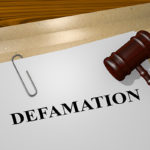Civil Remedies in NC for the Falsely Accused – Malicious Prosecution and Defamation
We get a lot of questions about what remedies a criminal defendant has if they are falsely accused of a crime. For information on criminal consequences of filing a false police report, check out our Obstruction of Justice blog here. In this blog, we focus on the civil remedies that may be available to the falsely accused. Criminal defendants oftentimes want to know, can I sue the person that falsely accused me? While the answer depends largely on the specific facts of the case and the aims of the falsely accused, we explore two civil actions in this blog – malicious prosecution and defamation.
Civil Remedies in General
First, it is important to discuss what we mean by “civil remedy.” A civil action is different from a criminal action. A civil action is where you “sue someone”. A person who initiates a civil action is called a plaintiff. To initiate a civil action, you start by filing a Complaint with the court. This triggers a long and complicated civil process that eventually ends in litigation, settlement, or dismissal.
Malicious Prosecution
The name of this civil wrongdoing may seem misleading because it doesn’t have anything to do with Prosecutor/District Attorney or the State. Rather, it has to do with the individual who brought the false charges against the criminal defendant. We focus on this civil action as it relates to false criminal proceedings. So, when can a criminal defendant sue a person for malicious prosecution? A criminal defendant may have a case if all of the following are true:
- The person being sued initiated a legal proceeding against the criminal defendant (now a plaintiff) – for example, they filed a false police report;
- The proceeding ends in a acquittal or dismissal;
- The person who initiated the legal proceeding had an improper person (meaning it was not a mistake but rather, was done for some kind of malicious purpose, for example)
- The criminal defendant-turned-plaintiff was damaged in some manner.
Defamation of Character
In a nutshell, generally, defamation is making an intentionally or negligently false statement against a person and “publishing” that statement to a third party. The statement must cause injury to the person (e.g., harm the reputation of the plaintiff). Generally, this harm must amount to actual monetary loss. However, certain types of statements are so inherently nasty that the court may award damages to a plaintiff even if there was no actual monetary loss.
Note that defamation becomes more complicated when you are dealing with “public figure”, but we are not going to get into all of that.
No matter how offensive a statement is, if it is true, it is not defamation. Truth is a complete defense to defamation in North Carolina. Similarly, an offensive opinion is not defamation.
You may have noticed that it takes a lot more in North Carolina to sue someone for defamation (and prevail) than you may have previously thought.
If you are criminal defendant in need of a criminal defense attorney, contact us today. We handle criminal defense matters in North Carolina and South Carolina, both at the State and Federal level.
